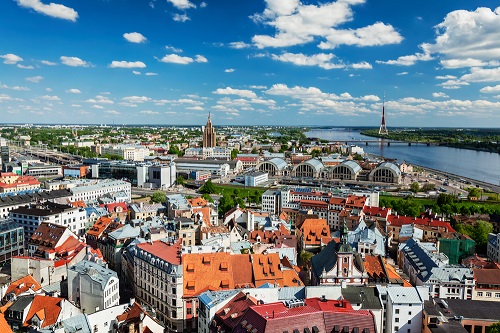If you suffer from a chronic illness and are planning to move to Latvia, then your access to healthcare should be a key consideration. Latvia has a two-tier healthcare system, with both national healthcare and a private sector. Your entitlement to access public healthcare will depend to some extent on your country of origin. For example, if you are a member of an EU state, you will be able to use your EHIC. You will also have some options under the public system if you are British.
Many expats choose to take out private cover during their stay in Latvia, and you may wish to do this if you have a chronic condition. Although Latvia has universal healthcare, it does not rank well in terms of healthcare standards. We will look at some of your options below.
How does the Latvian healthcare system work?
If you are a permanent resident in Latvia, you are entitled to access state-funded healthcare under the same conditions as Latvian nationals.
Health insurance is applicable to all employees and self-employed persons who have made mandatory contributions, although there are some limited exceptions to this.
If you are a UK citizen, you may be entitled to state healthcare paid for by the UK. This will apply if you live in Latvia and receive:
- An exportable UK state pension
- A contribution-based employment support allowance
- Another exportable benefit
You will need to apply for a certificate of entitlement, known as an S1 certificate, and this will remain the case until the end of 2020 (and possibly beyond, depending on negotiations).
Note that if you are a UK citizen, you will not be allowed to use your EHIC card in Latvia.

The Latvian healthcare system and chronic illnesses
The leading cause of death among Latvian nationals is cardiovascular disease, and the second is cancer. Heart diseases and strokes have remained the two most common causes of mortality in Latvia since 2000, and they accounted for half of all deaths in 2014. Deaths from diabetes also increased drastically between 2000 and 2014. Chronic conditions afflict many people in Latvia, and your doctor should therefore be familiar with the more common chronic illnesses.
Public healthcare in Latvia was heavily impacted by budget cuts after the 2008 downturn. It is not held by the WHO to be of as high a standard as public healthcare in some other European nations. Chronic illnesses tend to be managed at primary care level, with GPs providing many of the necessary services. However, there has not hitherto been an overall, cohesive strategy relating to the management of these diseases.
The Latvian healthcare system recognises, however, that this is required. A number of policy documents have been drawn up in recent years relating to chronic disease management. There is some provision available. For example, the Vaivari National Rehabilitation Centre offers services related to chronic care, including:
- Neuro-rehabilitation programmes
- Education programmes in disease prevention
- Paediatric rehabilitation programme for children with conditions such as chronic lung diseases, myocarditis or rheumatism
- Adult rehabilitation programme that helps patients recover after heart surgery, chronic pulmonological diseases, myocarditis, rheumatism and other diseases
The national healthcare system has begun to set up guidelines to define roles, responsibilities, and how different stakeholders interact at particular care levels. They cover disease prevention, health promotion, primary and secondary care, criteria for specialist consultation, and availability of health services.
Primary care at a GP level is likely to have a central role in chronic disease management. There are also plans for an increase in nursing staff for those GP practices that have a high proportion of patients with chronic disease, as well as training for primary care staff on supporting patient self-management and other services. The development of home healthcare at primary level has also been planned.
The state system covers:
- GP visits, including one annual preventative check-up
- Specialist visits
- Laboratory tests
- Home care
- Emergency medical assistance
- Hospital care
- Rehabilitation
- Reimbursed prescriptions and medical devices

You will need to pay a fee to see a doctor. Some people are exempt, but exemption categories may not include some chronic illnesses. If in doubt, check with your GP’s practice. However, many of the services above will apply to you, as a sufferer from a chronic illness, if you choose to go down the public healthcare route.
For specialised medical care, you will need a referral from a doctor, usually your GP. However, if you suffer from certain diseases, you will not need a referral to see any of the following:
- Pneumonologist (lung doctor specialising in tuberculosis)
- Endocrinologist
- Oncologist
- Chemotherapy specialist
The patient’s fee cannot be refunded in Latvia, but you can claim reimbursement when you get home.
Applying for disability/sickness benefit
To claim invalidity benefit (invaliditātes pensija), you must obtain a State Medical Commission for the Assessment of Health Condition and Working Ability (SMCAHCWA) ruling. You must also have made social security contributions for at least three years. You will receive €60 to €102 per month, depending on the severity of your disability/illness.
Private cover for chronic illness
Note that the country is becoming a destination for medical tourism. If you choose to access the private sector, you will find a wide range of treatments available, in a health tourism cluster consisting of state, municipal and regional hospitals, private clinics, medical rehabilitation centres and resort hotels. Private medical tour organisations can arrange individually tailored rehabilitation programmes for you. Riga has at least one breathing clinic, which may be of help if you are asthmatic. It also has a specialist endocrinology and diabetes clinic, which can assist if you suffer from diabetes.
Health insurance from local providers in Latvia is said to be cheap: around €60 per year. However, you may find that these policies are limited and that they do not cover you for all contingencies. Therefore, many expats opt for health insurance from the main international providers, especially if they have a chronic condition.

